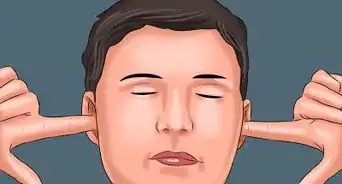wikiHow is a “wiki,” similar to Wikipedia, which means that many of our articles are co-written by multiple authors. To create this article, 11 people, some anonymous, worked to edit and improve it over time.
There are 13 references cited in this article, which can be found at the bottom of the page.
This article has been viewed 113,227 times.
Learn more...
Feeling a little lazy? Do you wish that you could achieve more or spend your time more productively? Want to lose weight quickly or ace your exams? The art of self-discipline is all about keeping your eyes on the prize so that you can achieve your goals. If you want that powerful sense of control that comes with disciplining yourself, we’re here to help you learn more!
Steps
-
1Eat healthy; this is a golden rule. Eat at least 5 fruits or vegetables a day and avoid fast food at all costs.[1] Gather up all the food in your house that you like yet that you know is bad and burn it/throw it away. Even foods such as coffee and energy drinks which claim to help you will only worsen your mood and overall health. Avoid alcohol and cigarettes/illegal drugs are a no-go.[2] Eat only fruit and healthy cereals for breakfast for a week and see if you can stick to it.
-
2Get rid of your vices. Pull the plug from your TV/computer/games console and ask a family member/friend to hide the cable. Throw away any cigarettes or illegal drugs you have: don't even try to sell them. try to give up something you do often for pleasure that is otherwise useless, such as masturbation or going on Facebook, for at least a week. The longer you go on for without resorting to vices, the more satisfied you will feel, until eventually you will find you have no further need for it.[3]Advertisement
-
3Exercise is vital. As well as enhancing your fitness, it sharpens your nerves and increases your learning/information retaining capability, as well as making you more docile and less likely to cause trouble.[4] Don't overexercise though, as you will feel tired and this encourages you to flop in front of the TV or eat some chocolate, none of which are particularly good ideas.[5]
-
4Sleep well. Get as much as you can every day. Avoid using electronics immediately beforehand: try reading instead. Avoid having lie-ins, even at weekends: it encourages you to act lazy later on in the day. If you find yourself tired whenever you get up early instead of lying-in, well that means you aren't going to bed early enough.[6]
-
5Culture yourself. Stop watching mindless reality shows on the TV and read more often. Read anything informative: novels, magazines, dictionaries, travel guides... anything that will improve your general knowledge. Avoid things like media review magazines though. If you're lacking books around the house, surf the web: find random but helpful articles on things, but bear in mind that not everything it says will be true. By being a cultured person, you will have more knowledge at your disposal to tackle problematic situations, and will appear more interesting to people you meet. Treat reading as a leisure pastime as a substitute for television/video games or any other vice you want to ditch.[7]
-
6Punish and test yourself. This doesn't include physical brutality or self-harming. A good thing to do is write out a list of rules to stick to, such as "no TV, no chocolate, no lie-ins, etc." and take a very cold shower whenever you break one. This seems harsh, but it's a very efficient disciplinary method since it deters you from breaking your personal rules.[8]
-
7Train your mind. As well as reading, do maths problems from a schoolbook or internet site. Do about 20 minutes a day: the questions don't have to be hard, but they should require thinking and use of logic. Don't overdo this, since you will tire your brain out.[9]
-
8Be polite and reasonable. Although it seems normal nowadays for teenagers and young adults to have outbursts of rage and foul language, this is in fact very immature. Don't worry about accidental swearing, such as when you burn your finger or stub your toe, since this is a product of conditioning and is almost automatic.[10] When conversing with friends, family, colleagues, etc. maintain a friendly, confident tone.
-
9Get rid of emotional extremes. These include hatred, spite, anger, sorrow, jealousy, etc. They are mostly useless and will cloud your judgment. Stop reading newspapers/watching news channels at all times. Suppress your strong feelings: although it seems natural to voice your hateful opinion of something, it is in fact foolish. Hold no grudge against anyone, but respect your dignity and don't give in to those who wrong you. Don't be biased, and be open-minded. Respect other people etc. Avoid excessive emotional attachment (falling in love too often/throwing the words "love" and "hate" around).[11]
-
10Make sure you are in a good mood as often as possible without having to resort to vices.[12]
Warnings
- Take the above processes seriously, otherwise you will never change.⧼thumbs_response⧽
References
- ↑ https://www.nhs.uk/live-well/eat-well/eight-tips-for-healthy-eating/
- ↑ https://pubs.niaaa.nih.gov/publications/aa71/aa71.htm
- ↑ https://www.huffpost.com/entry/how-to-quit-a-vice_b_1026593
- ↑ https://www.nhs.uk/live-well/exercise/exercise-health-benefits/
- ↑ https://medlineplus.gov/ency/patientinstructions/000807.htm
- ↑ https://www.mayoclinic.org/healthy-lifestyle/adult-health/in-depth/sleep/art-20048379
- ↑ https://www.lifehack.org/articles/lifestyle/42-practical-ways-to-improve-yourself.html
- ↑ https://www.lifehack.org/articles/productivity/5-excellent-ways-rewardpunish-yourself-reach-goals.html
- ↑ https://www.health.harvard.edu/mind-and-mood/train-your-brain
- ↑ https://www.youtube.com/watch?v=QAjqhyENhVU
- ↑ https://www.apa.org/topics/anger/control
- ↑ https://www.lifehack.org/articles/communication/little-things-you-can-keep-you-good-mood-all-the-time.html
- ↑ https://www.psychologytoday.com/us/blog/what-mentally-strong-people-dont-do/201505/9-ways-get-past-self-pity
































































